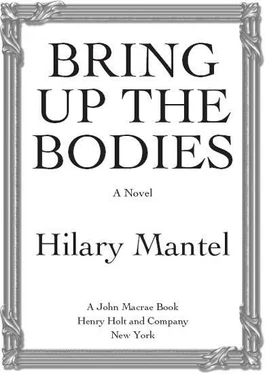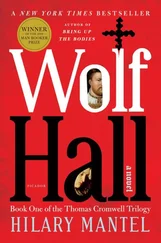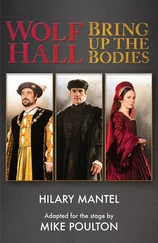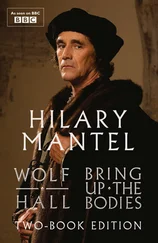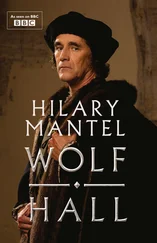Hilary Mantel - Wolf Hall - Bring Up the Bodies
Здесь есть возможность читать онлайн «Hilary Mantel - Wolf Hall - Bring Up the Bodies» — ознакомительный отрывок электронной книги совершенно бесплатно, а после прочтения отрывка купить полную версию. В некоторых случаях можно слушать аудио, скачать через торрент в формате fb2 и присутствует краткое содержание. Жанр: Старинная литература, на английском языке. Описание произведения, (предисловие) а так же отзывы посетителей доступны на портале библиотеки ЛибКат.
- Название:Wolf Hall: Bring Up the Bodies
- Автор:
- Жанр:
- Год:неизвестен
- ISBN:нет данных
- Рейтинг книги:5 / 5. Голосов: 1
-
Избранное:Добавить в избранное
- Отзывы:
-
Ваша оценка:
- 100
- 1
- 2
- 3
- 4
- 5
Wolf Hall: Bring Up the Bodies: краткое содержание, описание и аннотация
Предлагаем к чтению аннотацию, описание, краткое содержание или предисловие (зависит от того, что написал сам автор книги «Wolf Hall: Bring Up the Bodies»). Если вы не нашли необходимую информацию о книге — напишите в комментариях, мы постараемся отыскать её.
Wolf Hall: Bring Up the Bodies — читать онлайн ознакомительный отрывок
Ниже представлен текст книги, разбитый по страницам. Система сохранения места последней прочитанной страницы, позволяет с удобством читать онлайн бесплатно книгу «Wolf Hall: Bring Up the Bodies», без необходимости каждый раз заново искать на чём Вы остановились. Поставьте закладку, и сможете в любой момент перейти на страницу, на которой закончили чтение.
Интервал:
Закладка:
‘After she was crowned, I remember she called her whole household together, men and maids, and she sermonised them on how they should behave, no gambling except for tokens, no loose language and no flesh on show. It’s slid a bit from there, I agree.’
‘Sir,’ Thurston says, ‘you’ve got flour on your sleeve.’
‘Well, I must go upstairs and sit down in council. Don’t let supper be late.’
‘When is it ever?’ Thurston dusts him tenderly. ‘When is it ever?’
This is his household council, not the king’s; his familiar advisers, the young men, Rafe Sadler and Richard Cromwell, quick and ready with figures, quick to twist an argument, quick to seize a point. And also Gregory. His son.
This season young men carry their effects in soft pale leather bags, in imitation of the agents for the Fugger bank, who travel all over Europe and set the fashion. The bags are heart-shaped and so to him it always looks as if they are going wooing, but they swear they are not. Nephew Richard Cromwell sits down and gives the bags a sardonic glance. Richard is like his uncle, and keeps his effects close to his person. ‘Here’s Call-Me,’ he says. ‘Will you look at the feather in his hat?’
Thomas Wriothesley comes in, parting from his murmuring retainers; he is a tall and handsome young man with a head of burnished copper hair. A generation back, his family were called Writh, but they thought an elegant extension would give them consequence; they were heralds by office, so they were well-placed for reinvention, for the reworking of ordinary ancestors into something more knightly. The change does not go by without mockery; Thomas is known at Austin Friars as Call-Me-Risley. He has grown a trim beard recently, has fathered a son, and is accreting dignity each year. He drops his bag on the table and slides into his place. ‘And how is Gregory?’ he asks.
Gregory’s face opens in delight; he admires Call-Me, and he hardly hears the note of condescension. ‘Oh, I am well. I have been hunting all summer and now I will be back to William Fitzwilliam’s household to join in his train, for he is a gentleman close to the king and my father thinks I can learn from him. Fitz is good to me.’
‘Fitz.’ Wriothesley snorts with amusement. ‘You Cromwells!’
‘Well,’ Gregory says, ‘he calls my father Crumb.’
‘I suggest you don’t take that up, Wriothesley,’ he says amiably. ‘Or at least, Crumb me behind my back. Though I’ve just been out to the kitchens and Crumb is nothing to what they call the queen.’
Richard Cromwell says, ‘It’s the women who keep the poison pot stirred. They don’t like man-stealers. They think Anne should be punished.’
‘When we left for the progress she was all elbows,’ Gregory says, unexpectedly. ‘Elbows and points and spikes. She looks more plush now.’
‘So she does.’ He is surprised the boy has noticed such a thing. The married men, experienced, watch Anne for signs of fattening as keenly as they watch their own wives. There are glances around the table. ‘Well, we shall see. They have not been together the whole summer, but as I judge, enough.’
‘It had better be enough,’ Wriothesley says. ‘The king will grow impatient with her. How many years has he waited, for a woman to do her duty? Anne promised him a son if he would wed her, and you wonder, would he do so much for her, if it were all to do again?’
Richard Riche joins them last, with a muttered apology. No heart-shaped bag for this Richard either, though once he would have been just the kind of young gallant to have five in different colours. What a change a decade brings! Riche was once the worst kind of law student, the kind with a file of pleas in mitigation to set against his sins; the kind who seeks out low taverns where lawyers are called vermin, and so is obliged in honour to start a fight; who arrives back at his lodgings in the Temple in the small hours stinking of cheap wine and with his jacket in shreds; the kind who halloos with a pack of terriers over Lincoln’s Inn Fields. But Riche is sobered and subdued now, protégé of the Lord Chancellor Thomas Audley, and constantly to and fro between that dignitary and Thomas Cromwell. The boys call him Sir Purse; Purse is getting fatter, they say. The cares of office have fallen on him, the duties of the father of a growing family; once a golden boy, he looks to be covered by a faint patina of dust. Who would have thought he would be Solicitor General? But then he has a good lawyer’s brain, and when you want a good lawyer, he is always at hand.
‘Bishop Gardiner’s book is not to your purpose,’ Riche begins. ‘Sir.’
‘It is not wholly bad. On the king’s powers, we concur.’
‘Yes, but,’ Riche says.
‘I was moved to quote to Gardiner this text: “Where the word of a king is, there is power, and who shall say to him, what doest thou?”’
Riche raises his eyebrows. ‘Parliament shall.’
Mr Wriothesley says, ‘Trust Master Riche to know what Parliament can do.’
It was on the questions of Parliament’s powers, it seems, that Riche tripped Thomas More, tripped and tipped him and perhaps betrayed him into treason. No one knows what was said in that room, in that cell; Riche had come out, pink-faced, hoping and half-suspecting that he had got enough, and gone straight from the Tower of London to him, to Thomas Cromwell. Who had said calmly, yes, this will do; we have him, thank you. Thank you, Purse, you did well.
Now Richard Cromwell leans towards him: ‘Tell us, my little friend Purse: in your good opinion, can Parliament put an heir in the queen’s belly?’
Riche blushes a little; he is nearly forty now, but because of his complexion he can still blush. ‘I never said Parliament can do what God will not. I said it could do more than Thomas More would allow.’
‘Martyr More,’ he says. ‘The word is in Rome that he and Fisher are to be made saints.’ Mr Wriothesley laughs. ‘I agree it is ridiculous,’ he says. He darts a look at his nephew: enough now, say nothing more about the queen, her belly or any other part.
For he has confided to Richard Cromwell something at least of the events at Elvetham, at Edward Seymour’s house. When the royal party was so suddenly diverted, Edward had stepped up and entertained them handsomely. But the king could not sleep that night, and sent the boy Weston to call him from his bed. A dancing candle flame, in a room of unfamiliar shape: ‘Christ, what time is it?’ Six o’clock, Weston said maliciously, and you are late.
In fact it was not four, the sky still dark. The shutter opened to let in air, Henry sat whispering to him, the planets their only witnesses: he had made sure that Weston was out of earshot, refused to speak till the door was shut. Just as well. ‘Cromwell,’ the king said, ‘what if I. What if I were to fear, what if I were to begin to suspect, there is some flaw in my marriage to Anne, some impediment, something displeasing to Almighty God?’
He had felt the years roll away: he was the cardinal, listening to the same conversation: only the queen’s name then was Katherine.
‘But what impediment?’ he had said, a little wearily. ‘What could it be, sir?’
‘I don’t know,’ the king had whispered. ‘I don’t know now but I may know. Was she not pre-contracted to Harry Percy?’
‘No, sir. He swore not, on the Bible. Your Majesty heard him swear.’
‘Ah, but you had been to see him, had you not, Cromwell, did you not trail him to some low inn and haul him up from his bench and pound his head with your fist?’
‘No, sir. I would never so mistreat any peer of the realm, let alone the Earl of Northumberland.’
‘Ah well. I am relieved to hear that. I may have got the details wrong. But that day the earl said what he thought I wanted him to say. He said that there was no union with Anne, no promise of marriage, let alone consummation. What if he lied?’
Читать дальшеИнтервал:
Закладка:
Похожие книги на «Wolf Hall: Bring Up the Bodies»
Представляем Вашему вниманию похожие книги на «Wolf Hall: Bring Up the Bodies» списком для выбора. Мы отобрали схожую по названию и смыслу литературу в надежде предоставить читателям больше вариантов отыскать новые, интересные, ещё непрочитанные произведения.
Обсуждение, отзывы о книге «Wolf Hall: Bring Up the Bodies» и просто собственные мнения читателей. Оставьте ваши комментарии, напишите, что Вы думаете о произведении, его смысле или главных героях. Укажите что конкретно понравилось, а что нет, и почему Вы так считаете.
